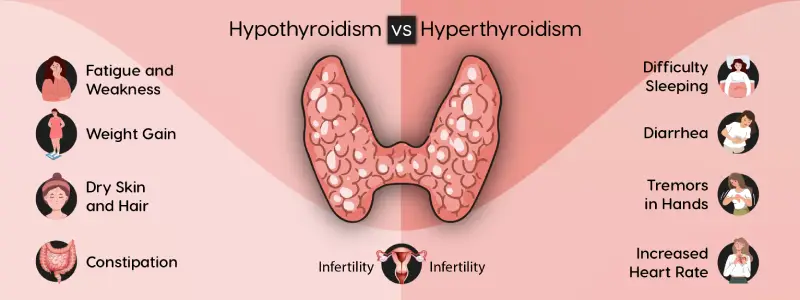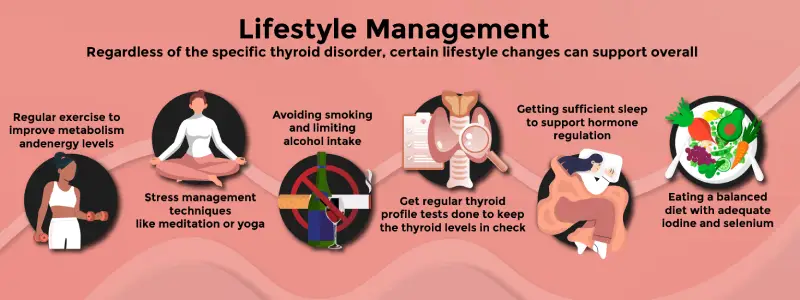Archives
Located in the anterior neck, the thyroid gland is a small, butterfly-shaped organ. Despite its size, it plays a crucial role in regulating various bodily functions. The thyroid produces hormones that control metabolism, energy levels, and other essential processes. When the thyroid gland functions abnormally, it can lead to a range of symptoms and health issues. In this blog, we will explore everything you need to know about thyroid disorders, including their symptoms, effects, diagnosis, and available treatments.
The Thyroid and Its Function
The thyroid gland, situated just below Adam’s apple, is part of the endocrine system. It produces two main hormones: thyroxine (T4) and triiodothyronine (T3). These hormones help regulate metabolism, heart rate, body temperature, and play a crucial role in the development of the brain, muscles, and organs in children.
Symptoms of Thyroid Disorders
Thyroid disorders are classified into two main categories: hypothyroidism (underactive thyroid) and hyperthyroidism (overactive thyroid). Each condition exhibits distinct symptoms:

Hypothyroidism
- Fatigue and Weakness
- Weight Gain
- Cold Intolerance
- Dry Skin and Hair
- Constipation:
- Muscle Aches and Stiffness
- Depression or Mood Swings
- Menstrual Irregularities in Women
Hyperthyroidism
- Increased Heart Rate
- Anxiety and Irritability
- Unexplained Weight Loss
- Sweating and Heat Intolerance
- Tremors in Hands
- Diarrhea
- Difficulty Sleeping
- Enlarged Thyroid Gland (Goiter)
Effects of Thyroid Disorders
Thyroid disorders can have far-reaching effects on various body systems. If left untreated, they can lead to serious health complications:- a. Cardiovascular System:Both hypothyroidism and hyperthyroidism can affect heart function, potentially leading to irregular heart rhythms, high blood pressure, and an increased risk of heart disease.
- b. Metabolism:Hypothyroidism slows down metabolism, leading to weight gain and fatigue. On the other hand, hyperthyroidism accelerates metabolism, causing weight loss and increased appetite.
- c. Reproductive Health: Thyroid disorders can disrupt menstrual cycles and may lead to fertility issues in women.
- d. Mental Health: Thyroid imbalances can contribute to mood swings, depression, anxiety, and difficulty concentrating.
- e. Bone Health: Untreated thyroid disorders may lead to decreased bone density, increasing the risk of osteoporosis.
Diagnosis of Thyroid Disorders
If you experience symptoms associated with thyroid disorders, it is essential to seek medical evaluation. Physicians use several tests to diagnose thyroid issues:- a. Blood Tests: Measurement of thyroid-stimulating hormone (TSH), T4, and T3 levels can help determine if the thyroid is functioning properly.
- b. Imaging: Ultrasound and other imaging techniques can identify structural abnormalities in the thyroid gland, such as nodules or enlargement.
- c. Radioactive Iodine Uptake Test:This test helps diagnose hyperthyroidism and assess the gland's ability to absorb iodine.
Treatment Options
The treatment approach for thyroid disorders depends on the specific condition and its severity:- a. Hypothyroidism Treatment: Synthetic thyroid hormone medication (levothyroxine) is the standard treatment, replacing the missing thyroid hormones in the body.
- b. Hyperthyroidism Treatment:
- Anti-thyroid medications: Methimazole or propylthiouracil can help reduce thyroid hormone production.
- Radioactive iodine therapy: This treatment aims to destroy overactive thyroid cells selectively.
- Thyroidectomy: Surgical removal of part or all of the thyroid gland may be necessary in severe cases.

Lifestyle Management
Regardless of the specific thyroid disorder, certain lifestyle changes can support overall thyroid health:- Eating a balanced diet with adequate iodine and selenium
- Regular exercise to improve metabolism and energy levels
- Stress management techniques like meditation or yoga
- Getting sufficient sleep to support hormone regulation
- Avoiding smoking and limiting alcohol intake
- Get regular thyroid profile tests done to keep the thyroid levels in check
Thyroid disorders can significantly impact a person’s well-being and quality of life. Recognizing the symptoms, seeking timely medical evaluation, and following the appropriate treatment plan are crucial for managing thyroid conditions effectively. Remember that each individual’s case is unique, and consulting with a qualified healthcare professional is essential for personalized diagnosis and treatment. By understanding the thyroid’s functions, symptoms, effects, diagnosis, and treatment options, we can take proactive steps towards maintaining thyroid health and overall wellness.
You might also like
The Diagnostic Value of CT Scans
Lab test at Home Food Intolerance Doctor at Home Physio
The Vital Role of Vaccinations: Essential for All Ages
Lab test at Home Food Intolerance Doctor at Home Physio
Breastfeeding Awareness Week: Simple Tips for New Moms
Lab test at Home Food Intolerance Doctor at Home Physio

